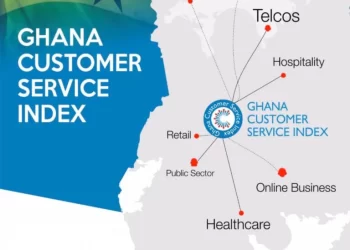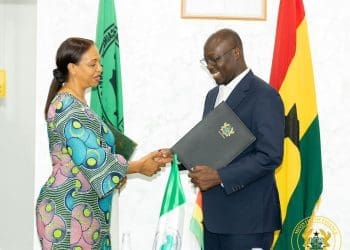For Ecobank, financial inclusion is both a mission and a measurable outcome grounded in expanding knowledge, access, and agency.
Dan Adu-Gyasi, an Ecobank Youth Ambassador and student at the University of Professional Studies, Accra, captured this holistic vision: “Financial inclusion means providing every individual, regardless of background, with the opportunity to access financial knowledge and tools that enable them to manage resources effectively. It encompasses the ability to save, invest, generate income, and plan for the future.”
As Adu-Gyasi’s experience illustrates, financial inclusion extends far beyond simply opening a bank account; it is anchored in four key pillars: access, usage, appropriateness, and empowerment. For an individual or enterprise to be truly financially included, all four dimensions must be met. This is why Ecobank stands as a genuine champion of financial inclusion; the institution systematically addresses each pillar.
Access is often the first aspect considered, defined as how easily individuals or businesses can open accounts and utilize financial services. Ease of access is influenced by procedural requirements. For instance, Ecobank’s Lite KYC Merchant Accounts offer a streamlined onboarding process for micro and small businesses, particularly within the informal sector. By reducing documentation barriers and aligning with regulatory thresholds, Ecobank enables sole proprietors and micro-enterprises to access formal financial services without the traditional obstacles.
Access also relates to physical proximity. Through the GrEEn Project in collaboration with UNCDF, Ecobank established 21 Xpress Points across rural communities. Customers who once had to invest significant time and resources to travel to major towns for banking can now access services directly within their localities.
However, account opening is not the culmination of financial inclusion; it is merely the starting point. The second pillar, usage, focuses on how customers actively engage with available financial products. Ecobank’s services are designed to integrate seamlessly into the daily operations of businesses and merchants.
The impact is evident in the data: in partnership with MTN and Jumo, Ecobank provides microloans to mobile-money wallet holders, a service utilised by approximately 11.8% of Ghana’s population.
With an average loan size of GH₵435 and a cumulative GH₵9.3 billion disbursed since 2019, this facility provides essential liquidity to individuals and small businesses during periods of need.
Notably, 65% of the funds disbursed were used for emergencies, food, and bills.
These microloans have been especially helpful in including youth and people in rural communities, with these two groups accounting for 66% and 47% of loans disbursed, respectively.
The third pillar is appropriateness. Premium banking products with fees or credit facilities requiring substantial collateral may serve a niche clientele but are unsuitable for advancing mass financial inclusion.
Ecobank’s Smart Business Pack addresses this gap by providing merchants with a suite of digital tools that bring comprehensive financial management to their fingertips.
Subscribers gain access to secure digital payment channels, including mobile money wallets, cards, and QR codes, and, after just 90 days, become eligible for affordable, collateral-free working-capital loans.
Finally, empowerment is the defining outcome of genuine financial inclusion.
Inclusion matters not merely for access, but for the transformational impact it enables—enhancing resilience, improving livelihoods, and catalysing business growth that uplifts entire communities.
Barbara Amevor, Founder of Sefa Fabrics and an Ecobank customer, affirmed this impact: “Ecobank has not only invested in my business but has also invested in my confidence as a female entrepreneur, proving that when women are empowered with the right opportunities, they can create lasting impact across industries and communities.”
Empowerment is integral to Ecobank’s inclusion strategy. Among individuals, a notable example is the Youth Banking Ambassadors Program, where 70 students were trained to promote digital financial services and onboard their peers to Ecobank’s mobile app.
Through this initiative, ambassadors earned allowances, developed practical experience in sales, marketing, and customer service, and gained internship opportunities, all while onboarding 8,900 peers to formal banking.
As Dan Adu-Gyasi reflected, “Beyond skill development, the program instilled discipline, teamwork, and financial responsibility.
Earning income during that period taught me to value hard work and proper money management. Overall, the ambassadorial experience was not just about banking; it was about personal growth, confidence, and developing a mindset for success.”
A flagship business-empowerment initiative is Ellevate, Ecobank’s program supporting female entrepreneurs through tailored financial solutions and non-financial “booster” services such as training in budgeting, marketing, and customer-experience design.
“As a woman entrepreneur leading an African fashion brand, access to the right financial tools, knowledge, and networks has always been essential for growth, and Ellevate has provided exactly that,” shared Barbara Amevor.
Together, these examples demonstrate how the four pillars operate in practice: simple, localised access; relevant and utilized products; appropriately designed services; and empowerment that translates inclusion into tangible socioeconomic progress. Ecobank’s combination of digital platforms, agent networks, targeted microcredit, and capacity-building initiatives exemplifies a holistic model for financial inclusion—one that transforms accounts into livelihoods and banking services into sustained economic opportunity for the people of Ghana.














